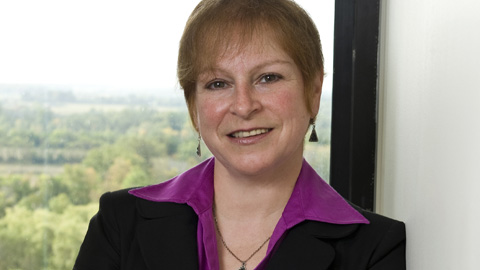The Canadian Commission for the United Nations Educational, Scientific and Cultural Organization (CCUNESCO) has appointed Brock biologist Liette Vasseur to head up one of its commissions.
Vasseur is President of CCUNESCO’s Sectoral Commission on Natural, Social and Human Sciences, an 11-member group of Canadian scientists, academics and others providing knowledge and expertise on a range of issues.
These include social and environmental impacts of climate change; conservation of natural heritage and water resources; inclusion of newcomers and vulnerable groups; reconciliation between indigenous and non-indigenous people; youth engagement; and measures to fight discrimination, racism, violence, bullying and radicalization.

Brock biologist Liette Vasseur, right, who was recently appointed as President of CCUNESCO’s Sectoral Commission on Natural, Social and Human Sciences, is pictured with Louise Vandelac, former Chair of the Canadian Commission for UNESCO’s Sectoral Commission on Human, Social and Natural Sciences, and Sébastien Goupil, General Secretary of CCUNESCO.
“We’re producing reflection papers on some of the topics we believe are important to come up with a long-range vision of how Canadians and the federal government can implement various actions related to sustainability,” explains Vasseur.
The Sectoral Commission advises CCUNESCO on the organization’s programs and activities in these areas.
In turn, CCUNESCO, operating under the Canada Council for the Arts, seeks to connect Canadians to the broader work of UNESCO, whose work “contributes to a peaceful, equitable and sustainable future that leaves no one behind.”
Vasseur’s Oct. 2 appointment is the latest in several leadership positions she holds at the international level since being named UNESCO Chair in Community Sustainability: From Local to Global in June 2014.
In September 2016, the International Union for Conservation of Nature (IUCN) named Vasseur as Vice-Chair North America and Caribbean Region on the IUCN’s 14-member steering committee of the Commission on Ecosystem Management. She oversees a portfolio of six of the commission’s 30 thematic and specialist groups.
The IUCN, based in Switzerland, is considered to be the leading authority on the natural environment, providing scientific research and expertise to governments and civic groups.
IUCN, drawing upon the knowledge of 16,000 experts worldwide, covers the areas of species survival, environmental law, protected areas, social and economic policy, ecosystem management, and education and communication. Its Red List of Threatened Species, which tracks the risk of extinction of thousands of plant and animal species and subspecies, is considered to be the world’s most comprehensive and authoritative inventory of Earth’s biological diversity.
She also leads the Commission on Ecosystem Management’s Ecosystem Governance group. Ecosystem governance is defined as ways that societies make decisions and develop actions in relation to the management of their ecosystems.
“In ecosystem governance, local decisions are promoted instead of a top-down approach to decision making as it’s context-dependent,” Vasseur explains. “The management of ecosystems depends on cultural and local circumstances.”
Within the ecosystem governance group, she is currently collecting case studies of ecosystem governance in different countries to better understand specific environmental protection measures that can help other communities in the world create their management plans.
“Community should be involved in decision-making, planning and implementation, monitoring and evaluation, or else efforts to protect the environment will not be successful,” Vasseur says.
Her leadership roles enable her to apply her expertise in many ways.
“It’s all about bringing people together, empowering people to figure out how to connect the dots in these issues,” she says.
“It’s important for me to give back and contribute to society.”







 Story from
Story from 


